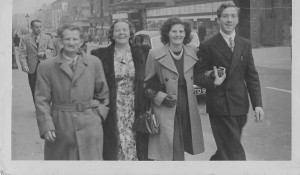Who Do You Think You Are? It’s a great programme, and makes for compelling TV. We’re all interested in the stories people have to tell, and every family history turns out to have complicated, often mysterious twists. As I walk around the University meeting new colleagues, I try to ask people to tell me something about themselves. It’s always interesting.
In the last years of her life, my mother-in-law set herself a task: to collect family history through old photographs. She managed to draw together a fabulous archive, and the albums which we now have are a treasured possession: they track elderly cousins back to the children they once were. They move through remarkably bewhiskered (male) or corseted (female) Victorians, almost to the beginning of photography in the second quarter of the nineteenth century. My wife and I got interested in these people and began to trace them through the census records now available online, and once we’d done that for her family we did the same for mine: it’s not difficult when you have a surname as distinctive as I have. So this is (part of) the story.
My father’s father grew up in the back streets of Wolverhampton. He enlisted in the army, which took him to India in the 1890s. I tracked down my paternal grandmother, his eventual wife: in the 1901 census she was listed as an orphan in a workhouse in Oxfordshire with her brother. I said to my father that I hadn’t known his mother had been in a workhouse- neither had he known, but he said that my grandmother simply never talked about her childhood. At the beginning of the First World War, my grandfather re-enlisted, and was on the Western Front for four years, coming back wounded and able to work only as a timekeeper in a textile factory; the same factory my father worked in after he left school at the age of fourteen, until he lost his job in the 1970s recessions, after which – and we’ll come back to this – he had a variety of other jobs.
My mother’s father was a coal miner, working in pits from the time he left school until he retired, and my maternal grandmother was in domestic service before she married him. My mother worked, first in shops and then in the same factory as my father until I was born.
My story is different. I didn’t leave school at the minimum leaving age. I stayed at school. I did A-levels. I went to university. I did a PhD. I met my wife at university. We have four – now adult – daughters, all of whom have been to university. I know that what made my life different was that exceptional people created opportunities for youngsters like me. The higher education I experienced changed my life, and, through that, changed the way my children thought about what was possible for them. Opportunity echoes through generations just as lack of opportunity does. It’s this, the great transformative potential of university, which is one of the things which shapes me, and drew me to this job.
After my PhD I trained to teach. I taught in urban comprehensive schools and was promoted through the ranks. It was important to me that I was part of extending opportunity to young people. It still is. From a career in schools, I went on to educate teachers and to lead education research. I wrote about how schools and education systems improve and how high quality is secured. I became a professor. I advised governments and lectured all over the world. It’s been a career beyond the imaginings of my grandparents. I’m very lucky. I’ve been able to work in and with universities and schools across the globe, and I’m fascinated by what makes for success in education and learning.
While my career was developing, my father’s work took an unexpected turn. He’d always been the most practical of men – designing, experimenting and making in a range of materials. In his fifties, having been made redundant several times, he found a job working for the War Pensions Board. He was employed to work with pensioned ex-servicemen and women to help them undertake whatever art or craft activity they wanted in their homes. As you can imagine, he met amazing people, often multiply disabled, on his travels. He brought back remarkable stories of what they created. It showed me that learning is not constrained by age, that the arts are incredibly powerful, that people are capable of remarkable things.
Why write this in my third week at Sheffield Hallam University? Well: one thing I have been doing since I arrived is to ask everyone I meet to tell me about themselves. This is some of my own answer to that question, and – I hope – gives you a sense of the experiences and values I bring to the University. I’m committed to the transformative potential of university, to the power of learning wherever it happens and to the importance of educational opportunities for individuals, groups and communities whatever the challenge. I’m realistic enough to know that none of this is ever easy, but optimistic enough to believe in what can be achieved. There is a quotation widely attributed to the great American anthropologist Margaret Mead. In fact, it turns out to be mis-attributed. She neither wrote nor appears to have said it, but it has been quoted in her name so often that we can almost believe she did say it: “Never doubt that a small group of thoughtful, committed citizens can change the world. Indeed, it is the only thing that ever has.”
